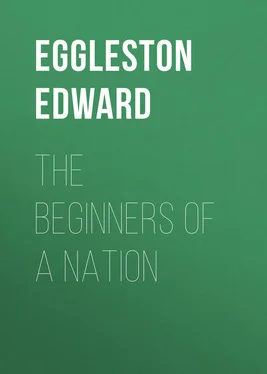Edward Eggleston - The Beginners of a Nation
Здесь есть возможность читать онлайн «Edward Eggleston - The Beginners of a Nation» — ознакомительный отрывок электронной книги совершенно бесплатно, а после прочтения отрывка купить полную версию. В некоторых случаях можно слушать аудио, скачать через торрент в формате fb2 и присутствует краткое содержание. Жанр: История, foreign_antique, foreign_prose, на английском языке. Описание произведения, (предисловие) а так же отзывы посетителей доступны на портале библиотеки ЛибКат.
- Название:The Beginners of a Nation
- Автор:
- Жанр:
- Год:неизвестен
- ISBN:нет данных
- Рейтинг книги:4 / 5. Голосов: 1
-
Избранное:Добавить в избранное
- Отзывы:
-
Ваша оценка:
- 80
- 1
- 2
- 3
- 4
- 5
The Beginners of a Nation: краткое содержание, описание и аннотация
Предлагаем к чтению аннотацию, описание, краткое содержание или предисловие (зависит от того, что написал сам автор книги «The Beginners of a Nation»). Если вы не нашли необходимую информацию о книге — напишите в комментариях, мы постараемся отыскать её.
The Beginners of a Nation — читать онлайн ознакомительный отрывок
Ниже представлен текст книги, разбитый по страницам. Система сохранения места последней прочитанной страницы, позволяет с удобством читать онлайн бесплатно книгу «The Beginners of a Nation», без необходимости каждый раз заново искать на чём Вы остановились. Поставьте закладку, и сможете в любой момент перейти на страницу, на которой закончили чтение.
Интервал:
Закладка:
Gilbert. In the year of Frobisher's first voyage, Sir Humphrey Gilbert issued a treatise to prove that there was a way to the East Indies round North America. This he demonstrated by a hydra-headed argument constructed after the elaborate fashion of that unscientific age, proving the existence of a northwest passage, first by authority, secondly by reason, thirdly by experience of sundry men's travels, and fourthly by circumstance. Voy., 184-227. Not content with getting to China by logic, and nothing daunted by Frobisher's brilliant failure, Gilbert mortgaged his estate that he might engage in attempts yet more disastrous than Frobisher's, and lost his life during his second voyage, in 1584.
Hakluyt. About this time there appeared on the scene the famous geographer, Richard Hakluyt, one of those men that exert a marked influence in favor of a new movement mainly by ardor and industry. Hakluyt's fervor was akin to enthusiasm, his belief of every story favorable to projects for colonization, and his unwavering faith in the projects themselves bordered on flat credulity. To men of his own time his tireless advocacy of American exploration and colony-planting must have seemed irksome hobby-riding. But he was the indispensable forerunner of colonization. "Your Mr. Hakluyt hath served for a very good trumpet," says Sidney. Believing in everything American as unwaveringly as if his soul's salvation depended on his faith, he believed in nothing more sublimely than in a passage to the "South Sea" or Pacific Ocean. He seized on every vague intimation of ignorant map-makers, on every suspicion of an explorer, on every fond tale of an Indian that tended to lend support to the theory in hand. All evidence was of equal weight in his scales, provided it lay on the affirmative side of the balance. It mattered little to him where his witnesses placed this elusive passage. In Hakluyt's mind it was ubiquitous. The Pacific is now "on the backside" of Montreal Island, and the great Laurentian lakes suffer a sea change; now it is reached by a river flowing three months to the southward – that is, the Mississippi. Then the much-sought strait is carried northward on the authority of an old map – "a great old round carde" – shown him "by the King of Portingall." But he had also seen "a mightie large old mappe in parchment" which showed, as far south as latitude 40°, a little neck of land "much like the streyte neck or Isthmus of Darienna." Hakl. Disc. on Western Planting. He had seen the same isthmus on another old map "with the sea joynninge hard on both sides as it doth on Panama." In a paper meant for private use, he expresses solicitude that the nearness of the Pacific to Florida shall not become known too commonly. N. Y. Col. Docs. I, 16. Many years later an injunction was granted in Holland forbidding a publisher to insert in a map the newly discovered channel into the South Sea.
III
Ralegh. Both Frobisher and Gilbert made ineffectual attempts to plant colonies in the new lands, but colony-planting held a place in their minds quite secondary to the search for the South Sea in the north and the finding of gold. It was only when the large and lucid mind of Sir Walter Ralegh took up the subject seriously that the settlement of an agricultural colony became for a while the real object of American voyages. Ralegh sent no men to the arctic or to the wintry shores of Newfoundland, as Frobisher and Gilbert had done. He turned to milder latitudes, and dispatched his explorers in 1584, and his colonists in 1585, to the coast of what is now North Carolina.
But the ever-mischievous South Sea delusion did not vanish when the period of colonization was reached. Ralph Lane's quest. Ralph Lane, the governor of Ralegh's first colony on Roanoke Island, having inquired perhaps for that western sea which Hakluyt had seen "on the mightie old mappe in parchment," understood the inventive savages to say that the Roanoke River sprang from a rock so near to a sea that the waves in storm often dashed into this fountain, making the river brackish for some distance below. That the story might be more interesting, they added that there was gold there, and that the walls of a town in that land were made of pearls. This is what the white men fancied the Indians said; but whatever they said was spoken in a tongue of which Lane's men had but the most scanty knowledge, if indeed it were not given mainly by signs. 3 3 Ralegh, in his History of the World, book i, chap, viii, sec. xv, has an interesting digression on the danger of trusting such communications, and he relates an anecdote of misapprehension by this very party sent under Grenville and Lane: "The same happened among the English, which I sent under Sir Richard Greeneville to inhabit Virginia. For when some of my people asked the name of that country, one of the savages answered, ' Wingandacon ,' which is as much as to say, as, 'You wear good cloaths,' or gay cloaths ." From this answer it came that the coast of North Carolina was called "Wingandacon," or, in its Latinized form, Wingindacoa, while the chief, or "king," of the country appears in the narratives of the time as Wingina. Ralegh says that Yucatan means merely "What say you?" and that Peru got its name from a similar mistake.
Nothing dispirited by the extravagance of these tales, Lane and some of his men set out to immortalize and enrich themselves – like a company of children running after the pot of gold at the end of the rainbow. Lane's Account in Hakl. III. While the crafty Indians were plotting the destruction of the colonists left behind, the governor and his followers pursued their quest until they were obliged to eat their dogs, made palatable by seething with a dressing of sassafras leaves. They returned, half famished and wholly disappointed, just in time to rescue the colony from destruction. But faith is faith, and despite his severe experience Lane went back to England believing that the Roanoke rose near to the Bay of Mexico "that openeth out into the South Sea." The map which the colonists brought with them when they abandoned the country in 1586 handed down the delusion, in another form, by showing a strait leading from the neighborhood of Port Royal into a body of water to the westward. 4 4 I found the original of this map among the drawings made by John White in the Grenville Collection in the British Museum. It was reproduced to accompany a paper of mine on the Virginia Colony in the Century Magazine of November, 1882. It excited interest among scholars, as it was supposed to have been previously unknown. A copy was afterward found, however, in the collection made by Dr. Kohl for the State Department at Washington. The drawings in the Sloane MSS., British Museum, attributed to John White by Dr. E. E. Hale, in the Transactions of the American Antiquarian Society, iv, 21, are not White's originals. The latter are in the Grenville Collection. See my comparison of the two in The Nation of April 23, 1891.
IV
Seeking the Pacific on James River. Twenty years after the return of Ralegh's first colonists the Jamestown company was sent to plant the germ of an English-speaking nation in North America. Beginning with the first voyage of Columbus, the search for a route through America had lasted a hundred and fourteen years. No passage north of Magellan's Strait had been found, yet a belief in the existence of such a water-way remained a part of the geographical creed of the time. The Jamestown emigrants were officially instructed to explore that branch of any river that lay toward the northwest, perhaps because the charmed latitude of 40° might thus be reached. It was in carrying out this instruction that Captain John Smith came to grief at the hands of the Indians while looking for the Pacific in the swamps of the Chickahominy. Smith rarely mixed his abounding romance with his geography; he is as sober and trustworthy in topographical description and in map-making as he is imaginative in narration. But Smith was at this time under the influence of the prevailing delusion, and he hoped that his second voyage up the Chesapeake would lead him into the Pacific. Hudson. His belief in a passage to the westward in latitude 40°, just beyond the northward limit of his own explorations, he communicated to his friend Henry Hudson, who was so moved by it that he sailed to America in 1609 in violation of his orders, and in seeking the strait to the South Sea penetrated the solitudes of the picturesque river that bears his name. Dermer. The explorer Dermer was intent on winning immortality by finding a passage to the Pacific when, in 1619, he was storm-driven into Long Island Sound. At Manhattan Island, or thereabout, he got information from the obliging Indians that made plain his way to the Orient. He was very secretive about this route, which, however, seems to have lain through Delaware Bay.
Читать дальшеИнтервал:
Закладка:
Похожие книги на «The Beginners of a Nation»
Представляем Вашему вниманию похожие книги на «The Beginners of a Nation» списком для выбора. Мы отобрали схожую по названию и смыслу литературу в надежде предоставить читателям больше вариантов отыскать новые, интересные, ещё непрочитанные произведения.
Обсуждение, отзывы о книге «The Beginners of a Nation» и просто собственные мнения читателей. Оставьте ваши комментарии, напишите, что Вы думаете о произведении, его смысле или главных героях. Укажите что конкретно понравилось, а что нет, и почему Вы так считаете.












